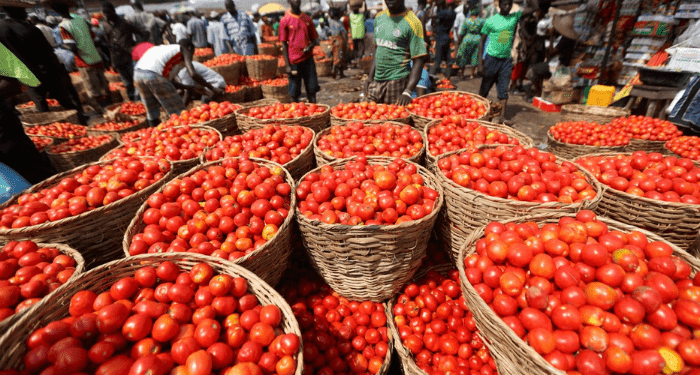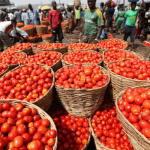Nigerian tomato farmers have lost over N2 billion due to a massive glut in 2024, with inadequate storage facilities leading to widespread waste. The annual oversupply, which typically occurs between January and March, has driven prices to record lows, leaving farmers struggling to recover their investments.
The crisis is particularly severe in the North, where most of Nigeria’s tomatoes are grown. Farmers had hoped to recoup losses from last year’s Tuta Absoluta outbreak, but instead, they face another financial blow.
“Our farmers have lost more than N2 billion to this situation. The investments we made are not yielding returns,” lamented Sani Danladi, national secretary of the Association of Tomato Growers, Processors, and Marketers Association of Nigeria.
Danladi explained that in Kano and Kaduna alone, over 500 tons of tomatoes are harvested daily. More than 20 trucks, each carrying about 25 metric tons, leave these states every day. Yet, without adequate storage and processing facilities, much of the harvest is wasted.
Post-harvest losses remain one of Nigeria’s biggest agricultural challenges, costing the economy around N3.5 trillion annually. Experts estimate that 45 percent of the country’s tomato harvest is lost due to poor storage and lack of processing capacity.
A report by PwC highlights Nigeria’s untapped potential in the global tomato market. With an annual production of 2.3 million metric tons, Nigeria is Africa’s second-largest tomato producer. However, without proper storage infrastructure, much of this yield goes to waste instead of boosting exports.
Tasiu Haruna, secretary of the Association of Tomato Growers, Processors, and Marketers (Kano Chapter), noted that many farmers lack the necessary training to handle post-harvest storage efficiently, worsening the crisis.
Rabiu Zuntu, chairman of the Tomato Growers and Processors Association of Nigeria, previously stated that up to 50 percent of harvested tomatoes are lost during the glut period due to poor storage and limited processing facilities.
The tomato glut has caused prices to plummet, with a big basket now selling for as low as N15,000— a staggering 90 percent drop from its peak price of N150,000 in May 2024. In Kaduna, prices have fallen even further, with a big crate selling for just N5,000.
The situation is not limited to tomatoes. Other agricultural staples have also recorded bumper harvests, but without sufficient storage, much of the surplus is at risk of being wasted.
This ongoing crisis highlights the urgent need for investment in cold storage, processing plants, and better training for farmers. If addressed, Nigeria could not only reduce losses but also position itself as a major tomato exporter in Africa.










